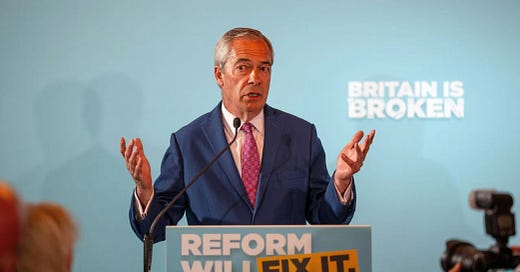Left on Economics, Lost on Immigration
Nigel Farage’s party is winning the economic argument, but floundering where it matters most
Reform UK may look like a typical right-wing party, but dig into its manifesto and you’ll find a surprising agenda: nationalise steel and utilities, scrap student loan interest, and restore the welfare state. These left-wing policies are part of a strategy to broaden Reform’s appeal by moving the party into the centre-ground.
For some, the centre-ground is synonymous with social liberalism, particularly the Lib Dem variety. Yet this is not where the vast majority of the British public stand. Rather, the real centre-ground in British politics is the complete opposite. It is what some have referred to as Blue Labour: right-wing on culture but left-wing on economics. Blue Labour, a faction within the Labour Party, advocates for reindustrialisation, the renationalisation of utilities, and drastically reduced immigration.
So, has Reform become Blue Labour? Is Reform UK leader Nigel Farage just “Jeremy Corbyn wrapped in a union jack”, as argued by Kemi Badenoch? Well, maybe so. But that is not necessarily a bad thing in the eyes of many voters. Moving left of economics is a tactically smart decision for Reform. Most British voters are “Blue Labour” at heart; they want a strong state, robust social security, and firm border controls.
Additionally, in the eyes of voters, nationalisation is not a radical idea. According to YouGov, a majority of voters are in favour of nationalising utility companies, and this support has increased substantially over the last seven years. The proportion of voters in favour of nationalising water companies has increased from 59 per cent in 2017 to 82 per cent last year, an increase of 23 points. This follows years of anger directed at water companies for allowing record levels of sewage discharge and then forcing customers to pay higher prices. Similarly, while a large number of voters want cuts to welfare, there is still widespread support for the winter fuel payment, which Farage is saying he will restore.
However, while its economic policies may appeal to a disillusioned electorate, Reform UK’s immigration platform is a different story — vague, impractical, and potentially self-defeating. So far, Reform has committed to reducing net immigration to zero and to stopping illegal immigration by pushing boats full of migrants back to France. Neither of these policies has received enough scrutiny.
Reducing net immigration to zero would certainly help alleviate some of the issues associated with mass immigration, such as the pressure on housing and infrastructure, as well as increased crime and racial tension. But how would this be achieved?
Blue Labour, which is a pressure group, has proposed drastically reducing immigration by “significantly increasing salary thresholds”. Would Reform do something similar? Until Farage reveals the measures he would take to reduce immigration, the British public will be asked to take his immigration agenda on faith.
This is an important issue, and there could be major downsides to an overly draconian immigration policy. Put shortly, the devil will be in the details. The salary threshold for skilled workers and those sponsoring a partner will be raised to £38,700 by early 2026 under current government plans. Raising the threshold even further would stop high-income and high-skilled workers from coming here and would break up families. What will Reform do when confronted with these awkward trade-offs?
In addition to workers, international students make up a significant proportion of the immigrants arriving in the UK. They account for 24 per cent of higher education students. How exactly does Reform intend to reduce the number of international students, and what impact will this have on our world-renowned universities? Naturally, Reform has little to gain from revealing specific measures, so the question must be directed to Farage regarding his exact plans for reducing immigration.
One of Reform’s policies announced in May of last year was to introduce an employer immigration tax. Richard Tice, who was then party leader, said, “…if you want to employ people, non-British passport holders, then we think it’s perfectly reasonable that you pay a premium on National Insurance, so actually what you should pay is National Insurance of 20 per cent”.
This would be up from the current rate of 13.9 per cent on all workers, not including the existing immigration skills charge, immigration health surcharges, and other costs. At present, government charges can amount to £12,000 to employ a foreign national for five years. Implementing another tax would pile additional costs on businesses and reduce hiring and employment across the economy, harming immigrants and natives alike. It would be a self-defeating policy.
Similarly, on illegal immigration, Reform UK’s policy seems to be as flimsy as the dinghies they wish to stop. Reform’s proposed policy to push the boats back to France would require cooperation with France and the EU, and it is highly unlikely that they will be willing to do us a favour without anything in return. They’d be more successful at stopping the boats by dressing up as seagulls and dive bombing them from the White Cliffs of Dover.
The only serious way to stop the boats is to deport illegal immigrants to a safe third country, while also providing safe and legal routes for genuine refugees and asylum seekers. The last Conservative government tried to do something like this with the Rwanda Scheme, but would Reform be willing to do something similar? Right now, we don’t know, but until they can provide a solid plan for illegal immigration, this issue will be a major weakness for them going into the next general election.
This is the problem with Reform: it has no idea how it will achieve its goals and has not looked at some of the difficult trade-offs and complexities involved regarding immigration. Reform’s economic shift might win hearts, but without a serious immigration plan, it risks losing votes.





Well constructed.